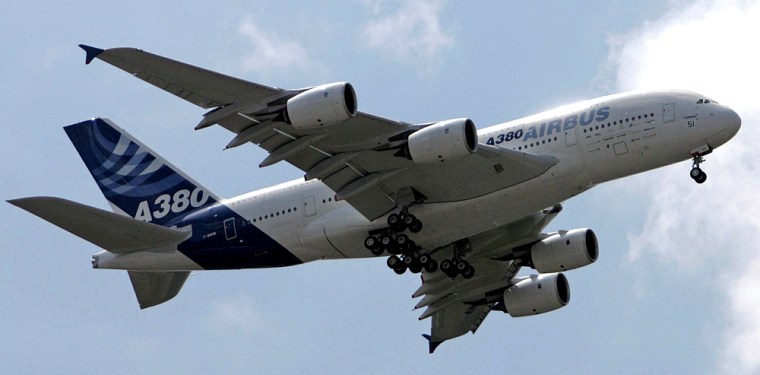Shares of Airbus’ parent company plummeted Wednesday after new delays in the delivery of the A380 superjumbo raised questions about the company’s management and strategy.
Emirates Airlines announced it is reconsidering its order of the double-decker A380, the world’s largest passenger aircraft, exacerbating an already delicate situation for European Aeronautic Defense & Space Co., parent company of Airbus.
Singapore Airlines and Qantas Airways, which also have large A380 orders, said they are seeking talks with Airbus and want compensation. Malaysia Airlines also was reviewing the terms of its agreement with Airbus to buy six A380s.
Airbus announced late Tuesday that A380 deliveries could be delayed by up to seven months because of bottlenecks with the plane’s electrical systems. It is the second time production of the A380 has been held up, with Airbus earlier pushing back the delivery date by six months.
Singapore Airlines delivered a second blow to Airbus by announcing it will buy 20 smaller Boeing 787-9 aircraft for about $4.5 billion and take options on another 20 planes. Airbus had hoped the Asian airline would be one of the first and biggest customers for another new model, the A350, that would compete directly with Boeing’s 787. But airline and leasing company dissatisfaction with the design of the A350 has led Airbus to consider a costly redesign of the plane, delaying its launch for several years.
EADS shares were were down almost 27 percent at 18.52 euros ($23.24) in afternoon trading. Market operator Euronext briefly suspended trading in the stock twice in the first hour after it fell beyond the limit allowed.
The Airbus troubles also dragged down BAE Systems PLC, which owns 20 percent of Airbus but has been seeking to sell its stake. BAE shares fell 3.2 percent to 337.75 pence ($6.22) on the London Stock Exchange.
Deliveries of the double-decker A380 likely will be limited to nine in 2007, Airbus said, with an additional shortfall of five to nine A380 deliveries expected in 2008 and “around five” in 2009. The first delivery to Singapore Airlines is still expected by the end of 2006.
“We’re not happy with the delay, but our focus right now is working with Airbus to minimize the delay,” said Singapore Airlines spokesman Stephen Forshaw.
Singapore was the first carrier to buy the $300 million plane, ordering 10 with an option to purchase another 15.
As for compensation, Forshaw said: “This is something we’ll be working on in due course.” He declined to disclose an amount or the time given to Airbus.
Emirates Airlines, which has 45 A380s on order, said it was told that delivery of its initial A380 would be delayed by six months, and it now expects to receive its first one in October 2007, to be put into operation in January 2008.
“We are considering our position and will be engaging with the manufacturer over the next few weeks,” the airline said in a statement.
Qantas Airways Ltd., which has ordered 12 of the new planes, had expected to receive two before the end of 2006.
“Our discussions with Airbus will center around the new delivery timetable, competitive issues, compensation and possible short-term replacement aircraft,” Qantas Chief Executive Geoff Dixon said Wednesday.
Airbus’ chief commercial officer, John Leahy, confirmed that the Toulouse, France-based company will incur more late delivery penalties, but declined to provide a figure. It could in theory also face order cancellations.
With the 555-passenger A380, Airbus wagered that the airline industry increasingly would offer large flights to international hubs. But rival Boeing Co. bet that air travel would be marked by the need for fuel efficiency and long-haul flights. It is building the smaller 787, which can carry 330 passengers.
“EADS made a strategic error by opting for a jumbo-sized jet rather than a fuel-efficient model, especially if the price of oil increases further,” said Matthieu Raimbault of French brokerage Viel Tradition.
The news is also a blow to EADS co-CEO Noel Forgeard, who in 2000 oversaw the launch of the A380 as the head of Airbus.
Deeply embarrassed by extra delays to a project that he pioneered while head of Airbus, Forgeard issued an implicit warning that the EADS subsidiary must get its house in order or face tighter controls from headquarters.
“I have built my entire industrial career on building confidence for shareholders. Since I have been (at) Airbus we have never missed a projection that we gave, and this announcement comes as a big blow,” he told analysts in a conference call.
“We have come very suddenly and recently to an area in which the message was that there was no longer a risk but a certainty of delays in deliveries,” Forgeard said.
Usually an approachable and ebullient public performer, Forgeard avoided the press Wednesday and confined his remarks to an audience of financial analysts in a call replayed on the Internet. EADS press handlers declined requests to speak to him.
When asked if he saw a threat to his own future, he said, “I think it is a shareholder decision. ... We have a board of directors, which has to appreciate the situation. ... The aim is to find the right way forward without finger-pointing.”
Analyst Sash Tusa of investment bank Goldman Sachs called the delay “very damaging both to the credibility of EADS management and also to Airbus’ reputation for program management.”
